Assam: Land of the Rhino.
Undoubtedly, and deservedly, the One-Horned Rhinoceros is a symbol of Assam’s culture, heritage, and history. The Rhino is a testament in many ways to the strength of the land and its people. Assam, the proclaimed “Gateway to the Northeast,” is very much the sentry at the gate that shapes the conversation and understanding of this part of India. I fully intend to further explore the experiences of Northeast India and its people; these pieces will feature first-person interviews and accounts, so they’re not purely opinion. Until then, I wanted to share this article to report my experiences in Assam from 2024. I want to skip past Kaziranga – though I insist that you don’t if you head to Assam – and instead take you on a journey outside of the beaten path. 2 hours off the beaten path to be exact.
This is a story of travel’s unique ability to transform. It transforms the extraordinary privilege of exploration into the unforgettable. And November 2024 unfurled a story I will never forget.
I landed in Guwahati’s airport – a brightly lit arrival hall adorned with tribal decor – with giddy excitement. I had two things on my agenda here:
- See a Rhino.
- Buy a sari with a Rhino on it.
You see, one of my passions in life (apart from food, travel, and making jokes no one understands) is textiles. Very much inherited from my late grandmother, a tailor and textile enthusiast herself, this passion has always woven (see what I did there), itself into the agendas of my travels. I also have a passion for turning things into jackets. One thing about me is that I love a jacket, a coat or perhaps even a cape. My favorite canvas for jacketification is definitely a sari. Hence, the hunt was on for two rhinos – one mammal and one silk.
For the uninitiated, Assam is a textile haven. A diverse pageant of heritage and traditions interweave to produce Assam’s textiles. In particular Assam is famous for its wild silks. The first, muga silk, a shimmery and naturally golden hued silk. Secondly, pat silk, glossy and naturally white. Finally, eri silk, warm and rustic. It is also known as Ahimsa silk since its harvesting does not involve the silk cocoon being boiled with the moth still inside.
My itinerary to Assam was already a jam-packed one. With a trip to Kazirange being the focal point. 4 hours each way from bustling Guwahati, Kaziranga truly is a paradise on Earth.
But 2 hours away from Guwahati is a rather inconspicuous village. It’s a scenic drive for sure, but the purpose of my visit was far more than just road-fervor. This village is home to Kabita di and her family. Kabita di has been weaving since she was only 12 years old, when she learned the skill from her mother. She has since transformed herself to a small business woman, selling her artisan weaves across India from her home here in Assam. Her journey eventually led her to Nila House in Jaipur. This is where our stories intersect. I visited Jaipur in July of 2024, returning to Chennai baked to a crisp, and well acquainted with Nila House having recently completed a workshop in Indigo dyeing. My search for artisans in Assam led me to Nila’s Connect database, a roster of artisan textile designers across India – featuring names, numbers, speciality and instagram handles! It’s all thanks to this database that I was blessed to discover Kabita di, and Monikanchan Handlooms.
We had already struck out a sari shop in Guwahati, where the salesman quoted me a truly absurd number for a silk sari adorned with rhinos. I wasn’t pleased. I knew that what I wanted was out there somewhere, and I wasn’t boarding that Indigo flight until I had it in my suitcase. That was when I turned to Nila Connect. Monikanchan was the first or second result on the list tagged under Assam, and it was in minutes that I dialed the phone and handed it to my father. A brief conversation revealed that Kabita di lived about 2 hours North of Guwahati, and was kind enough to invite us to her home.
The next day we piled into our car and drove off to meet the Wizard of Eri. I truly felt like I had crashlanded in Oz. As the car drew further and further from Guwahati, and our driver grew more and more confused as to where these out-of-towners were taking them, my excitement refused to be tempered. It took no less than 4 spotty-service punctuated phone calls for Kabita di to guide us to her abode. But the journey could not have been more worth it. Through snaking lanes we arrived to see Kabita di and her family flagging our car down. A flurry of Namaskars and joined palms led us into her house, past a massive Bamboo handloom stationed proudly in the courtyard. As we were invited to take a seat in the humble living room, Kabita di’s husband explained that this was the first time a customer had made the journey to meet them at home. The whole family voiced that it was an honor to welcome us, and I returned with what an honor it was to have been invited to their space.
Hospitality in India is absolutely no joke. One-by-one the three family members – Kabita di, her husband, and her daughter – exited the room, leaving my three family members – my mom, my dad, and myself – sharing a bench in their living room. An air of confusion descended on the room, as my family traded glances. Suddenly, Kabita di returned with her family – armed with betal nut leaves, kumkum and gamosas. A gamosa, as we learned, is a traditional Assamese scarf that is integral to the culture and practices of the State and its people. Present at just about any special function in Assam, it is also used to welcome respected guests. It was such a deep honor to have been welcomed with such graciousness by the family. But it didn’t stop there. Out came the trays of food.
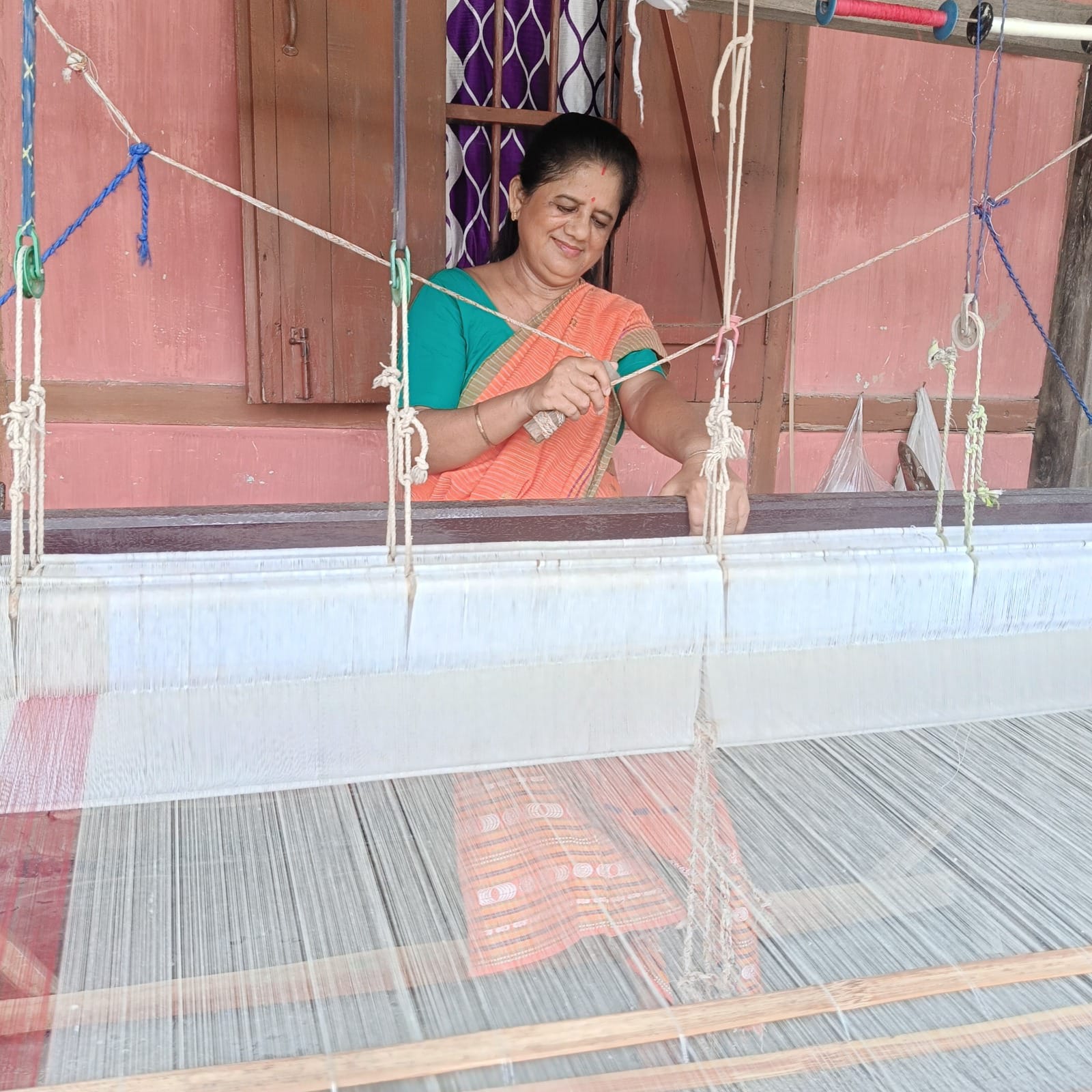
A platter of traditional Assamese sweets, many made by Kabita di herself the day before, were presented to our awestruck faces. From gulab jamun to biscuits from a local store, to a rice cake – almost like a sweet idly? – the food was delectable, and my family and I were simply blown away by the gesture. Somehow, we still weren’t done yet! Our hosts explained that no function in Assam is complete without black rice kheer – and there in three golden goblets (I kid you not) came the honored dessert. I don’t even have the word to express how these events made me feel. It was just an all-prevailing sense of gratitude, honor, awe, and respect.
We were soon immersed in the shopping. From cupboards and below beds, and other rooms, came fabric after fabric. Stoles, scarves, gamosas, towels, and most importantly, saris! I still remember the moment I locked eyes with her, a gorgeous red and white saree with rhinos traversing the width, butterflies dotted through the fabric and flowers to boot. I found it, the Rhino Sari.
It was quite a colorful affair. With mustards, greens, blues, pinks, and reds – both eri and pat silks abound. Our haul was no short of at least 20 items. 3 saris, 6 meters of running fabric, 6 stoles, 4 scarves, and the gamosas we had been gifted.
4 hours passed peacefully at their home, with ceremony and tradition stitched into every word, every gesture. Our palms joined again to bid good health and success to each other. With bags in tow, we buckled into our car. All three of us were stunned to silence – no easy achievement all things considered – and I knew that this story was made to be told.
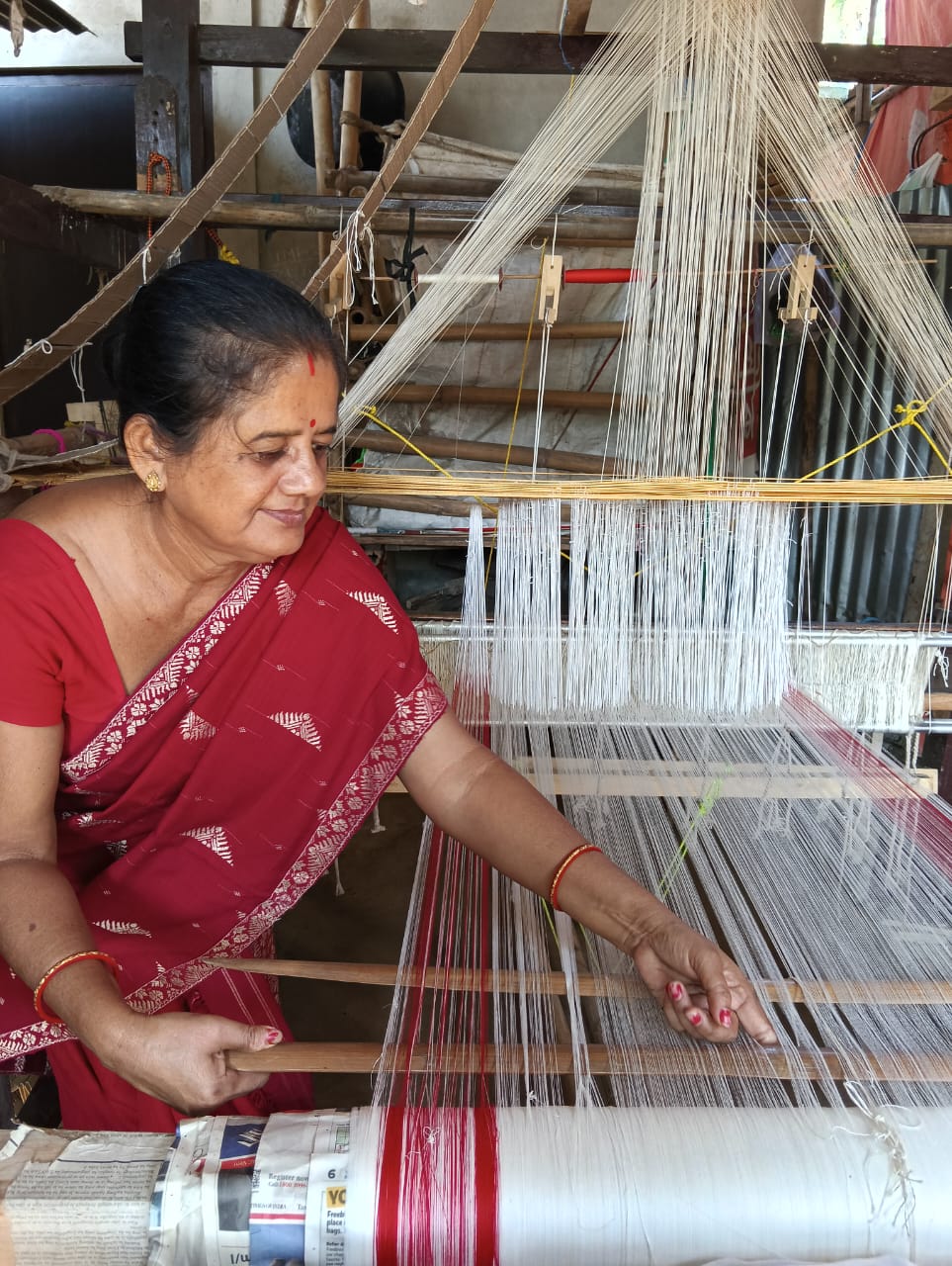
In preparation for this article I called Kabita di and was delighted to hear that she remembered us. I had called from my personal number, rather than my father’s, and she joked that if I called from dad’s number she would have recognized instantly. I put my broken Hindi through the ringer, but was so touched to know that the family was doing well, their daughter had gotten married, and that they had new products they’d like to share with the world.
Artisans like Kabita di make India what it is. Through their art and ingenuity, artisans from potters to weavers are keeping traditions alive in the most meaningful ways, and we all have a responsibility to hear and share their stories. To uplift and support them when we can. To respect the work they put into each piece, and cherish them as heirlooms for decades to come.
Kabita di, you are an inspiration to me, from your abilities to your hospitality. And when Assam calls me again, I know the first stop on my journey.
Please find below the number to reach Kabita di if you’re interested in purchasing anything from her, and some photos she shared of products.
Kabita di, Weaver Assam – +91 6002669399
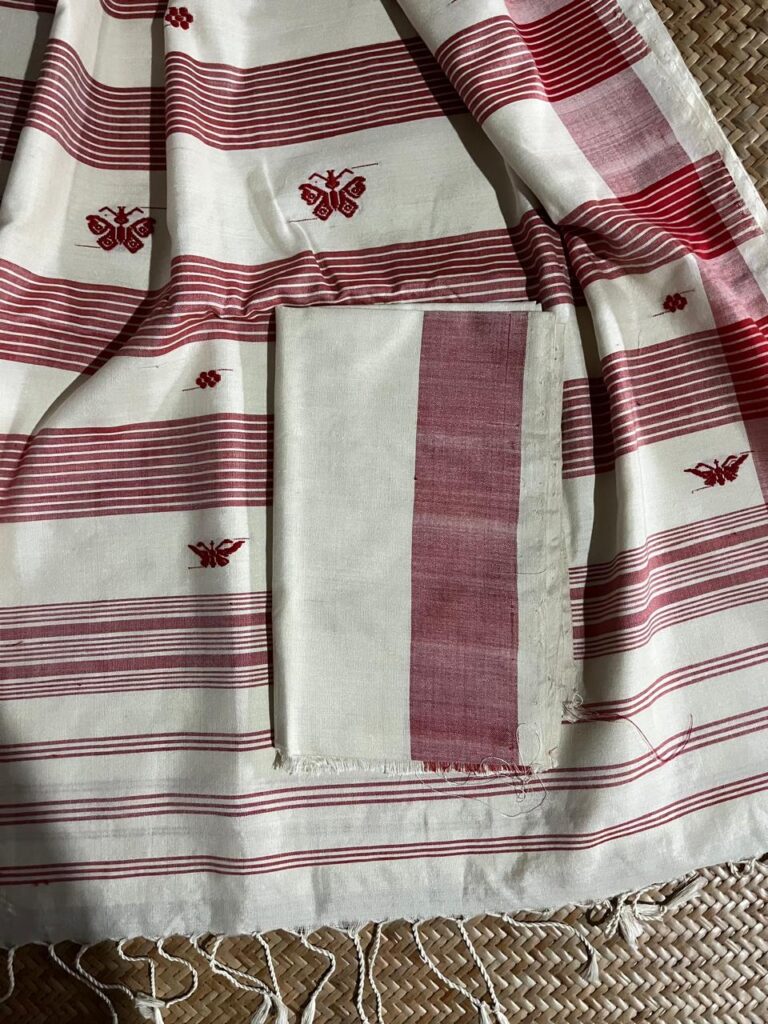
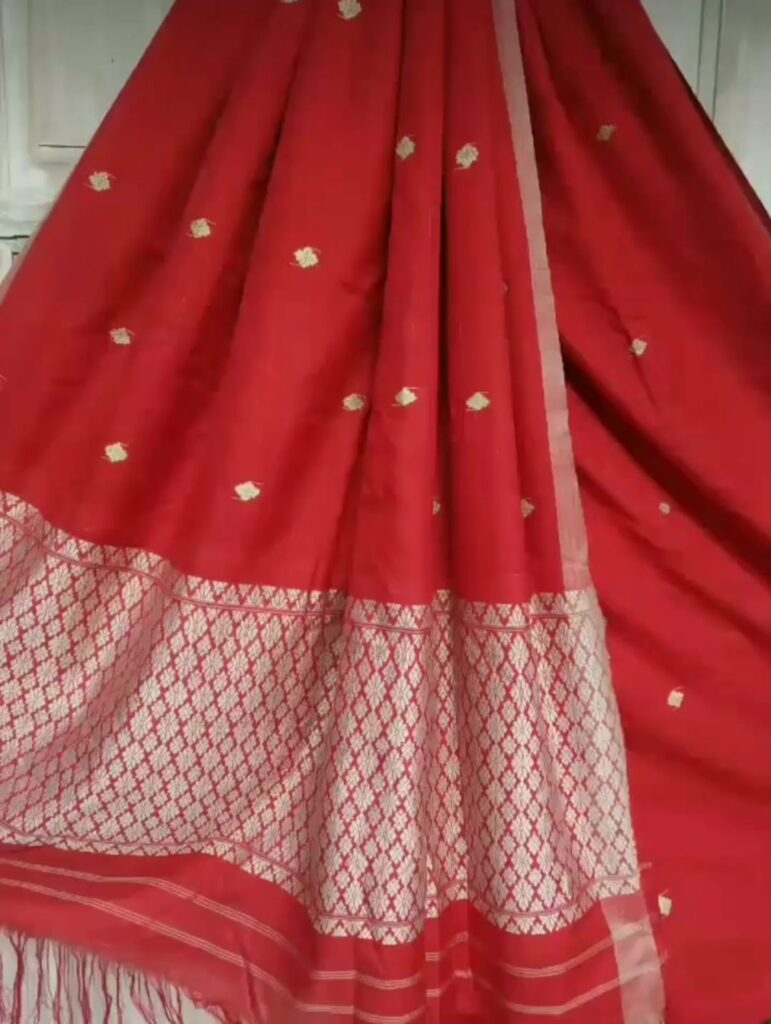
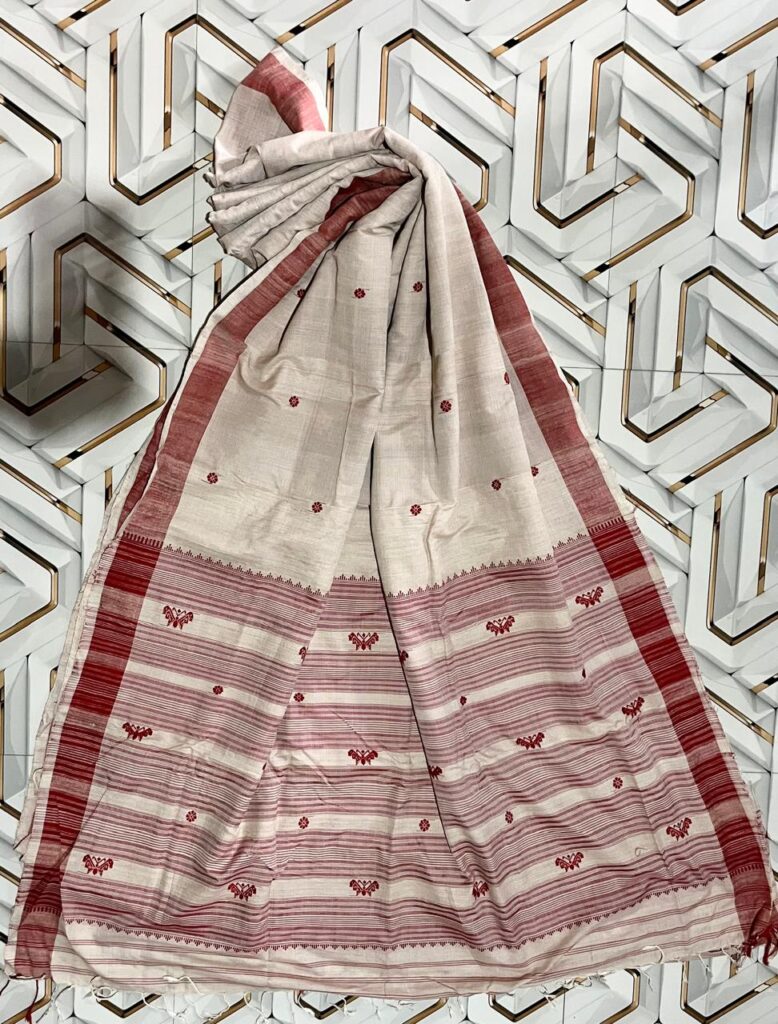
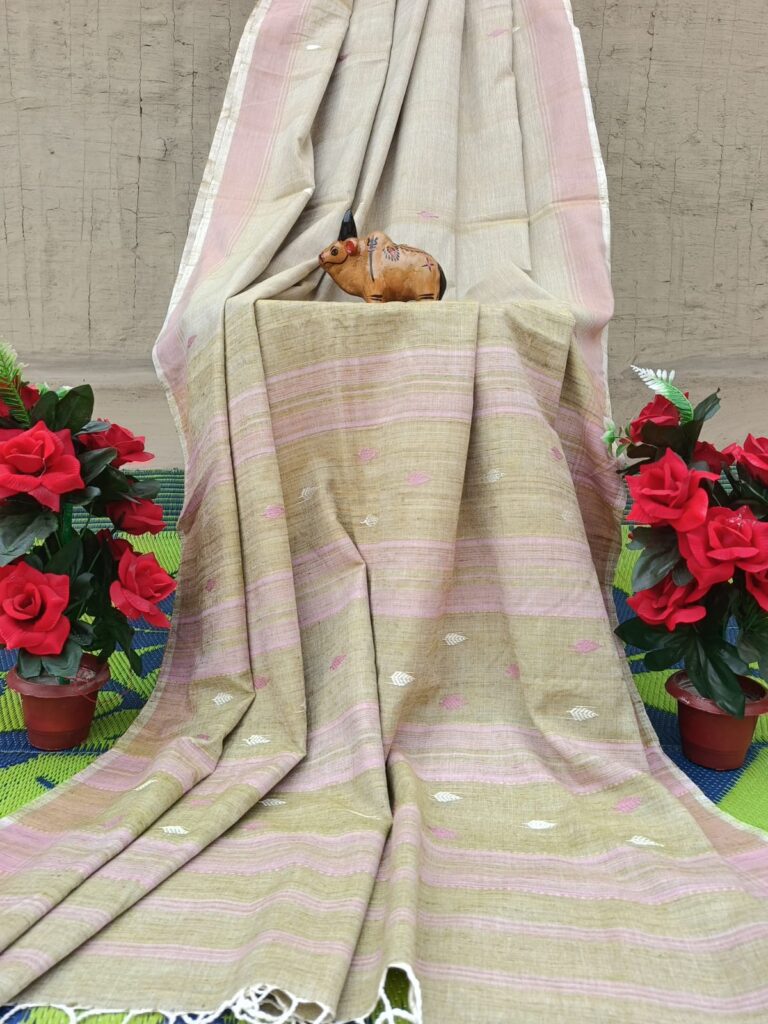
Leave a Reply